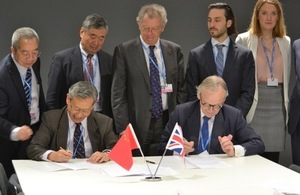UK-China agree to promote cooperation on climate change risk assessment at COP 21
UK and China are committed to jointly promoting climate risk assessment.

UK-China agree to promote cooperation on climate change risk assessment at COP 21.
At the Paris climate talks on 8th December, the UK Committee on Climate Change and China National Expert Committee on Climate Change, the two most prestigious advisory bodies to each country on climate change and energy issues signed a Working Agreement. This project aims to improve the assessment of climate change risk, and enhance the understanding of UK and Chinese government leaders as well as their policy-making bodies of the risks of climate change.
This Working Agreement is based on the fruitful collaboration between the two countries over the last two years. A report “Climate Change - A Risk Assessment” was produced by experts from the UK, China, the US and India and launched in London and Beijing earlier this year. The work has gained important recognition at several high level occasions especially the Chinese president’s visit to the UK in October.
This report argues that the risks of climate change should be assessed in the same way as risks to national security or public health. That means focusing on understanding the worst things that could happen, and how likely they are to occur. It identified thresholds of risks generated by climate change. These include limits of human tolerance for heat stress, and limits of crops’ tolerance for high temperature as well as potential limits to coastal cities’ ability to successfully adapt to rising sea levels. The report recommends climate change risk assessments should be updated regularly and communicated to political leaders at the highest level.
In this Working Agreement, the two Committees agreed to ongoing close cooperation on climate change risk assessment. This includes identifying indicators of risks and carrying out cooperation and research in the three priority areas: the pathway of global emissions; the direct risks faced by natural systems due to climate change; and the risks arising from the interaction of climate change with complex human systems. A high-level steering group will be formed to provide overall direction and guidance to the risk assessment process and to communicate the findings to top leaders of their own country.
A work meeting will be co-organised by the two Committees in January 2016 to bring experts from the UK and China to talk in detail on implementation of this agreement.
Sir David King, the British Foreign Secretary’s Special Representative on Climate Change spoke at the meeting and said:
The aim of today’s agreement is for scientific expertise to deliver the information necessary to help our leaders form a view on the overall scale of the risks of climate change.
This should show the level of priority needed to manage these risks.
Deputy Director General of Climate Change Department of NDRC of China, Mr. Sun Zhen also attended the meeting and acknowledged the long term cooperation between experts from the two countries on climate change. He said:
The UK has rich experience in risk management. I hope this UK-China working agreement between the two Committees would further promote tangible cooperation between two countries in the area of climate change risk management, and provide recommendations for policy makers of both the UK and China.
Background
The report ‘Climate Change: A Risk Assessment’ is available online.
The lead authors of the report are Sir David King, the British Foreign Secretary’s Special Representative for Climate Change; Professor Daniel Schrag, a member of the US President’s Council of Advisors on Science and Technology; Professor Zhou Dadi, a member of the China National Expert Committee on Climate Change; Professor Qi Ye, Director of the Brookings-Tsinghua Centre for Public Policy and Management at Tsinghua University, China; and Dr Arunabha Ghosh, CEO of the Council on Energy, Environment and Water, one of India’s leading climate and energy policy think tanks. In total, the report includes contributions from over 40 scientists, as well as from experts in security, finance, and economics, from eleven different countries.
Background of the report ‘Climate Change: A Risk Assessment’
The climate change risk assessment undertaken to produce this report was informed by a series of four meetings, one in each of the countries of the lead authors. In November 2014, experts in energy technology and policy met at Harvard University to discuss the future trajectory of global greenhouse gas emissions. In January 2015, a meeting to discuss climate science and risk was hosted by the China National Expert Committee on Climate Change at Tsinghua University in Beijing. In March 2015, a group of senior retired military and diplomatic officers, international security analysts and scientists met in Delhi to discuss the systemic risks of climate change, hosted by the Council on Energy, Environment and Water, and facilitated by the CNA Corporation. Finally, experts in finance, technology, science, economics and politics met at Lancaster House in London in April 2015 to discuss valuing the risks of climate change, and the nature of a proportionate response.
The project was commissioned by the UK Foreign and Commonwealth Office, as an independent contribution to the climate change debate. Its contents represent the views of the authors, and should not be taken to represent the views of the UK Government.
Co-sponsorship for the meetings and the report was provided by the China National Expert Committee on Climate Change, the Skoll Global Threats Fund, the Global Challenges Foundation, the Institute and Faculty of Actuaries, and the Willis Research Network. Specific elements of the project were also supported by the UK Department of Energy and Climate Change, the UK Government Office for Science, the China Meteorological Administration, and the Climate Change Science Institute at Oak Ridge National Laboratory.